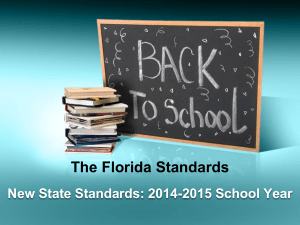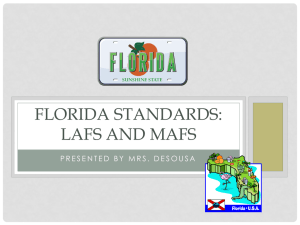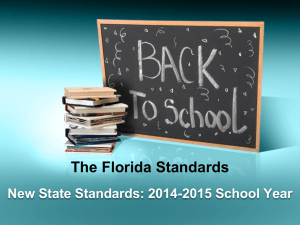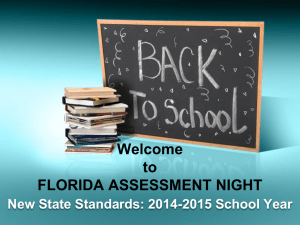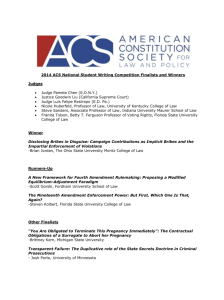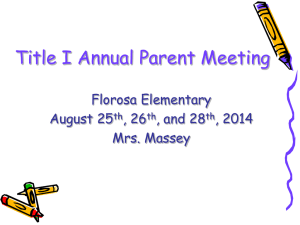Parents` Guide to the Florida Standards
advertisement
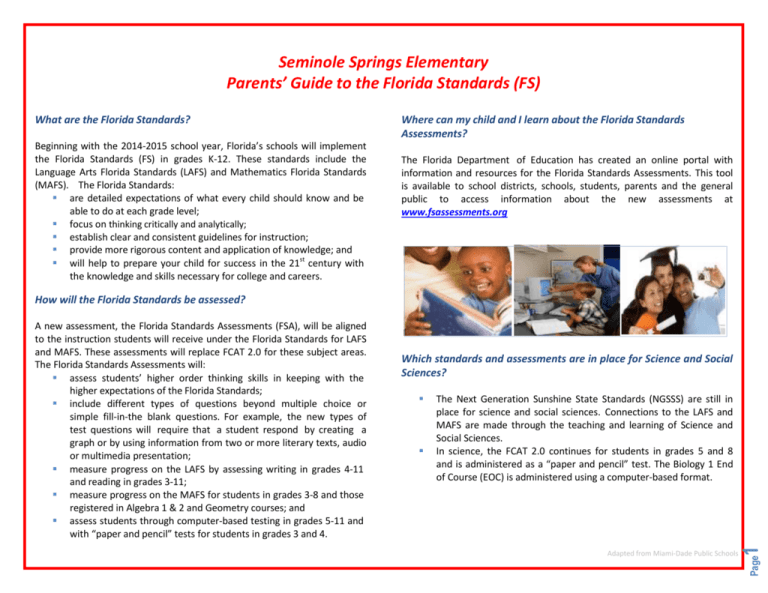
Seminole Springs Elementary Parents’ Guide to the Florida Standards (FS) What are the Florida Standards? Beginning with the 2014-2015 school year, Florida’s schools will implement the Florida Standards (FS) in grades K-12. These standards include the Language Arts Florida Standards (LAFS) and Mathematics Florida Standards (MAFS). The Florida Standards: are detailed expectations of what every child should know and be able to do at each grade level; focus on thinking critically and analytically; establish clear and consistent guidelines for instruction; provide more rigorous content and application of knowledge; and will help to prepare your child for success in the 21st century with the knowledge and skills necessary for college and careers. Where can my child and I learn about the Florida Standards Assessments? The Florida Department of Education has created an online portal with information and resources for the Florida Standards Assessments. This tool is available to school districts, schools, students, parents and the general public to access information about the new assessments at www.fsassessments.org How will the Florida Standards be assessed? Which standards and assessments are in place for Science and Social Sciences? The Next Generation Sunshine State Standards (NGSSS) are still in place for science and social sciences. Connections to the LAFS and MAFS are made through the teaching and learning of Science and Social Sciences. In science, the FCAT 2.0 continues for students in grades 5 and 8 and is administered as a “paper and pencil” test. The Biology 1 End of Course (EOC) is administered using a computer-based format. 1 Adapted from Miami-Dade Public Schools Page A new assessment, the Florida Standards Assessments (FSA), will be aligned to the instruction students will receive under the Florida Standards for LAFS and MAFS. These assessments will replace FCAT 2.0 for these subject areas. The Florida Standards Assessments will: assess students’ higher order thinking skills in keeping with the higher expectations of the Florida Standards; include different types of questions beyond multiple choice or simple fill-in-the blank questions. For example, the new types of test questions will require that a student respond by creating a graph or by using information from two or more literary texts, audio or multimedia presentation; measure progress on the LAFS by assessing writing in grades 4-11 and reading in grades 3-11; measure progress on the MAFS for students in grades 3-8 and those registered in Algebra 1 & 2 and Geometry courses; and assess students through computer-based testing in grades 5-11 and with “paper and pencil” tests for students in grades 3 and 4. Seminole Springs Elementary Parents’ Guide to the Florida Standards (FS) Students in grades K-12 should read stories and informational text. Some examples of informational texts are newspapers, magazines, technical manuals, science, social studies, and other content text books. Students should read text that becomes more complex as they advance through the grades. Ask your child’s teacher for grade level appropriate texts. Visit your local library and see links on appropriate reading lists. Students should be able to answer questions based on the texts they read. Ask your child to find answers to questions in the text, write about a book he or she has read and to take a position from a character’s perspective. Urge your child to use logical arguments to defend his or her opinion and research, explain reasons why, supported by facts and details. What can parents do to help his or her child prepare for success in science? Encourage your child to observe and question what is happening in the world around them. Ask your child’s teacher for guidance on finding resources to help your child learn science beyond the regular school day. Discuss science ideas with your child and have him or her explain these to you using pictures, graphs, etc. Explore the following science resources with your child: • Scholastic Study Jams http://studyjams.scholastic.com/studyjams/index.htm • PBS Learning Media http://wlrn.pbslearningmedia.org/ • FCAT Explorer http://www.fcatexplorer.com/ What can parents do to help their child prepare for success in MAFS? What can parents do to help his or her child prepare for success in social science? Watch the news, read the newspaper or other news source and compare/contrast information from multiple sources on the same topic. Talk to your child about the meaning of graphs, maps, charts, quotes, and political cartoons that you find using these resources. Visit www.timeforkids.com 2 Work with your child’s teacher to identify opportunities for enrichment or tutorials as needed. Assist your child with using mathematics terms precisely and making logical arguments. Ask your child’s teacher for guidance on finding resources to help your child learn mathematics beyond the regular school day. Discuss mathematics ideas with your child and have him or her explain these to you using pictures, graphs, etc. Urge your child to use logical arguments to defend his or her thinking and provide explanations supported by facts, details and accurate computations. Adapted from Miami-Dade Public Schools Page What can parents do to help their child prepare for success in LAFS?
